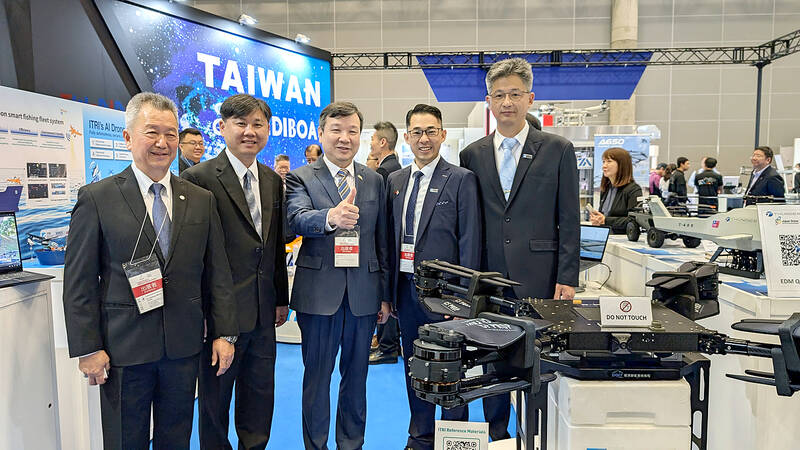A Taiwanese drone industry delegation that is currently attending a drone industry trade fair in Tokyo signed a memorandum of understanding (MOU) with a Japanese drone industry alliance yesterday, establishing a foundation for long-term collaboration in a range of areas including supply chain integration.
Hu Kai-hung (胡開宏), who heads the Taiwan Excellence Drone International Business Opportunities Alliance (TEDIBOA), is leading a Taiwanese delegation to Tokyo to showcase Taiwan’s R&D capabilities in the drone industry through the Taiwan pavilion at the Japan Drone exhibition, the TEDIBOA said in a statement.
The three-day event opened yesterday and runs through tomorrow.

Photo: Lin Tsui-yi, Taipei Times
The delegation includes representatives from Aerospace Industrial Development Corp (漢翔航空), Taiwan Defense Industry Development Association (國防產業發展協會), Taiwan Aerospace Industry Association (航太公會), Coretronic Intelligent Robotics Corp (中光電智能機器人), Thunder Tiger Corp (雷虎科技) and several other Taiwanese companies.
While in Tokyo, Hu signed an MOU with Yasuhiro Senda, executive vice president of Japan UAS Industry Development Association (JUIDA), the TEDIBOA said in the statement.
During the signing ceremony, Hu emphasized that JUIDA is one of Japan’s most representative drone industry organizations. The partnership aims to foster drone supply chain integration and speed up the entry of Taiwanese drone-related products into the Japanese market, according to the statement.
In the statement, the TEDIBOA highlighted the two countries’ complementary strengths in the drone industry, saying that Japan excels in precision machinery and automation, while Taiwan has advantages in semiconductors, cybersecurity, manufacturing and systems integration.
Future collaboration will focus on supply chain integration, including technology development, application implementation and market sharing, it said.
In addition, given that Taiwan and Japan have different regulatory systems in this field, this cooperation framework provides an effective platform for communication, helping reduce compliance barriers and facilitate market entry for both sides, the TEDIBOA indicated.
Currently, in its 10th edition, the Japan Drone exhibition has seen increasingly diverse industrial applications, particularly in disaster prevention and relief, surveying, monitoring and logistics.
The Japanese government has allocated over 100 billion yen (US$694.72 million) to promote the development of its drone industry, according to the statement.
The TEDIBOA was established by the Ministry of Economic Affairs in September last year and currently has around 200 members.

Sweeping policy changes under US Secretary of Health and Human Services Robert F. Kennedy Jr are having a chilling effect on vaccine makers as anti-vaccine rhetoric has turned into concrete changes in inoculation schedules and recommendations, investors and executives said. The administration of US President Donald Trump has in the past year upended vaccine recommendations, with the country last month ending its longstanding guidance that all children receive inoculations against flu, hepatitis A and other diseases. The unprecedented changes have led to diminished vaccine usage, hurt the investment case for some biotechs, and created a drag that would likely dent revenues and

Global semiconductor stocks advanced yesterday, as comments by Nvidia Corp chief executive officer Jensen Huang (黃仁勳) at Davos, Switzerland, helped reinforce investor enthusiasm for artificial intelligence (AI). Samsung Electronics Co gained as much as 5 percent to an all-time high, helping drive South Korea’s benchmark KOSPI above 5,000 for the first time. That came after the Philadelphia Semiconductor Index rose more than 3 percent to a fresh record on Wednesday, with a boost from Nvidia. The gains came amid broad risk-on trade after US President Donald Trump withdrew his threat of tariffs on some European nations over backing for Greenland. Huang further

CULPRITS: Factors that affected the slip included falling global crude oil prices, wait-and-see consumer attitudes due to US tariffs and a different Lunar New Year holiday schedule Taiwan’s retail sales ended a nine-year growth streak last year, slipping 0.2 percent from a year earlier as uncertainty over US tariff policies affected demand for durable goods, data released on Friday by the Ministry of Economic Affairs showed. Last year’s retail sales totaled NT$4.84 trillion (US$153.27 billion), down about NT$9.5 billion, or 0.2 percent, from 2024. Despite the decline, the figure was still the second-highest annual sales total on record. Ministry statistics department deputy head Chen Yu-fang (陳玉芳) said sales of cars, motorcycles and related products, which accounted for 17.4 percent of total retail rales last year, fell NT$68.1 billion, or

MediaTek Inc (聯發科) shares yesterday notched their best two-day rally on record, as investors flock to the Taiwanese chip designer on excitement over its tie-up with Google. The Taipei-listed stock jumped 8.59 percent, capping a two-session surge of 19 percent and closing at a fresh all-time high of NT$1,770. That extended a two-month rally on growing awareness of MediaTek’s work on Google’s tensor processing units (TPUs), which are chips used in artificial intelligence (AI) applications. It also highlights how fund managers faced with single-stock limits on their holding of market titan Taiwan Semiconductor Manufacturing Co (TSMC, 台積電) are diversifying into other AI-related firms.